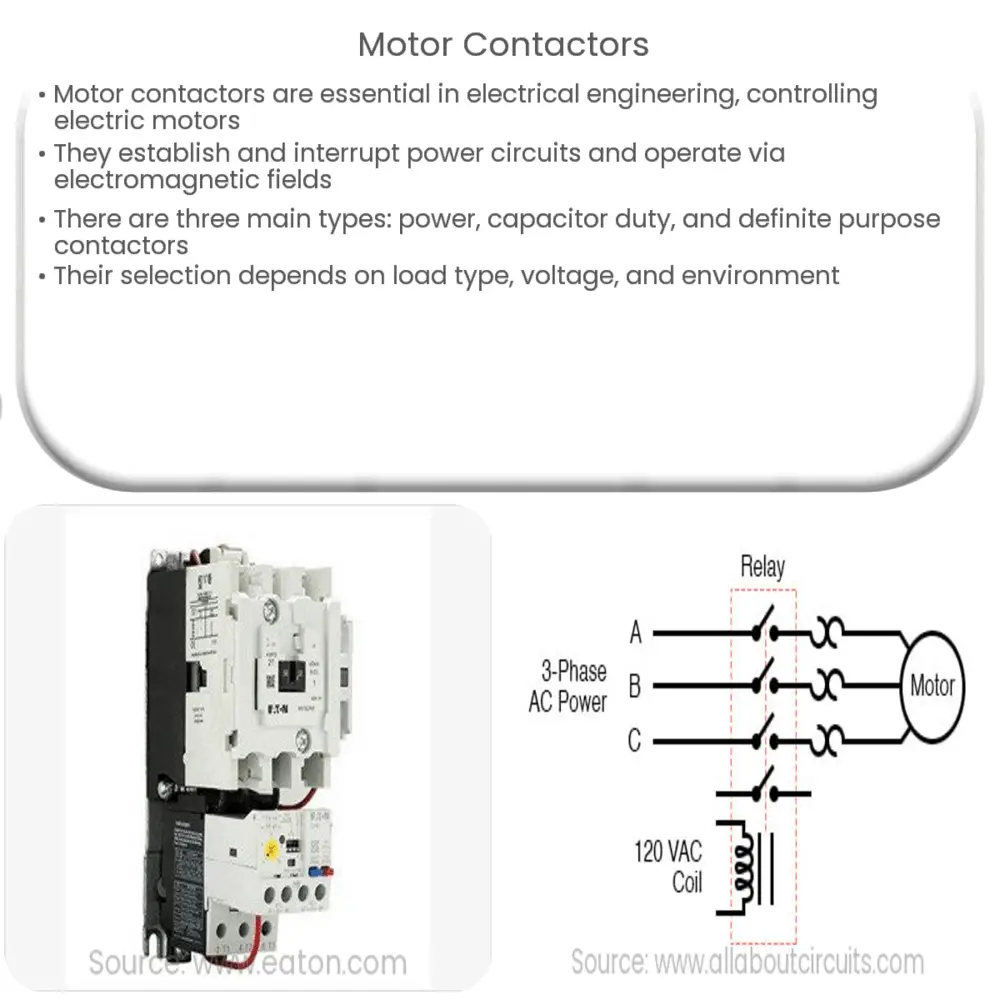Explore the world of motor contactors, their types, functions, applications, and importance in industrial and commercial settings.

Introduction to Motor Contactors
A motor contactor is a vital device used in electrical engineering, playing a key role in the operation and control of electric motors. This article aims to explore the fundamental aspects, functioning, and types of motor contactors.
What is a Motor Contactor?
A motor contactor is an electrical device that helps manage the flow of electricity to a motor. Its function is to repeatedly establish and interrupt an electrical power circuit. Contactors come in various designs and sizes, appropriate for different applications, but their core purpose remains the same.
Functioning of a Motor Contactor
Motor contactors operate by creating a bridge when the electromagnetic field is activated. The flow of electric current through the coil generates this field. This electromagnetic field pulls the contactor’s points together, completing the circuit.
Key Components of a Motor Contactor
- Coil: The coil, or solenoid, is the heart of a motor contactor. It generates an electromagnetic field when current passes through it.
- Contacts: These are the points that close to complete the circuit when the coil is energized.
- Frame: The frame houses the coil and the contacts, offering a structured and secure environment.
Types of Motor Contactors
There are three main types of motor contactors: the power contactor, the capacitor duty contactor, and the definite purpose contactor. Each has its specific application and characteristics.
- Power Contactor: This is the most common type, typically used to control the power supply to electric motors and other heavy-duty machines.
- Capacitor Duty Contactor: These contactors are designed to handle the high inrush current of capacitors.
- Definite Purpose Contactor: These are designed for specific applications such as HVAC systems, data processing, or food service equipment.
In the following sections, we’ll delve deeper into the working principles and specific applications of these contactors, providing a comprehensive understanding of their importance in various industrial and commercial settings.
Detailed Functioning of Motor Contactors
The operating principle of motor contactors is based on electromagnetism. When the contactor coil is energized, it creates an electromagnetic field. This field attracts the contactor’s movable contacts, pulling them towards the stationary contacts and closing the circuit. When the coil is de-energized, the electromagnetic field collapses, and a spring mechanism separates the contacts, thus opening the circuit.
Applications of Motor Contactors
Motor contactors are employed in various commercial and industrial settings. Their primary function is to control the power supply to electric motors. However, their usage extends to lighting control, heater control, and other electrical loads in industries. In commercial applications, they are often used in HVAC systems to regulate the power supply to compressors and motors.
Choosing the Right Motor Contactor
Choosing the right motor contactor depends on several factors, including the type of load, the required voltage, the current rating, and the operating environment. For instance, if the load type is a motor, then a power contactor would be suitable. If the application requires a high inrush current, a capacitor duty contactor is preferred. Finally, for specific applications, a definite purpose contactor would be the ideal choice.
Benefits of Using Motor Contactors
Motor contactors offer several benefits, including:
- Safety: They provide an additional layer of safety by enabling remote operation and control of power circuits.
- Efficiency: They can handle high-current loads efficiently.
- Versatility: With different types of contactors available, they can cater to a wide range of applications.
Conclusion
In conclusion, motor contactors are indispensable devices in electrical engineering, ensuring the smooth and safe operation of electric motors and other high-powered devices. They function based on the principles of electromagnetism and are designed to cater to a variety of applications. From controlling power supply to providing safety and efficiency, the role of motor contactors in industrial and commercial settings cannot be understated. Their selection should be carefully considered, taking into account the specific requirements of the application to achieve optimal performance.

